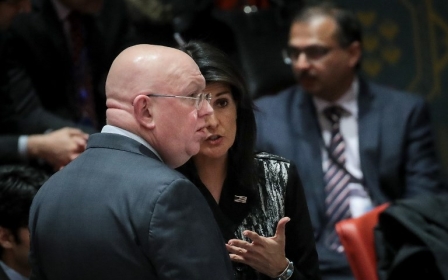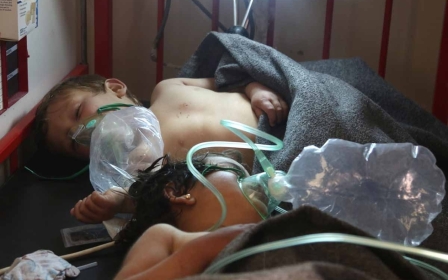British PM vows to punish 'barbaric' killers behind Syrian gas attack

LONDON - Syrian President Bashar al-Assad and his international backers, including Russia, "must be held to account" if his government is found to be responsible for a reported poison gas attack on a rebel-held town in Syria, Theresa May said on Monday.
Speaking in Copenhagen, the British prime minister said the attack was a "barbaric targeting of innocent civilians" and that the UK government was "urgently establishing what happened".
She said: "If confirmed this is yet another example of the Assad regime's brutality and brazen disregard for its own people.
"If found responsible the regime and its backers, including Russia, must be held to account."
Earlier on Monday Downing Street said it is working with its allies to agree “a range of options” in response to Saturday's reported poison gas attack.
The prime minister's spokesman said it was clear that those responsible “must be held to account” and that the prime minister would raise the issue during meetings with counterparts in Sweden and Denmark on Monday.
The comments came as Labour leader Jeremy Corbyn refused to comment on whether Syrian President Bashar al-Assad was behind the attack, as there was renewed speculation of joint US-French military action in Syria, and possible UK participation.
The Downing Street spokesman, said: "As the foreign secretary said in February, if there is a clear verified use of chemical weapons and a proposal for action where the UK would be useful then we will look at the range of options."
The spokesman also warned that Russia must not “yet again” obstruct the investigation into the chemical attack, as international discussions are ongoing in Washington, London and Paris over a possible military retaliation.
The prime minister's spokesman did not directly accuse Assad's forces of carrying out the chemical attack, but pointed to the "actions by the Assad regime in the past".
A big price to pay?
US President Donald Trump has said there would be a "big price" to pay, amid speculation that France would join in military action against Assad’s force in relation to the chemical weapons attack.
The US leader, who launched strikes against Assad's forces in April 2017 following a deadly gas attack, spoke to President Emmanuel Macron overnight and the two leaders reportedly agreed to coordinate a “strong joint response”.
When pressed by journalists, the Downing Street spokesman said he would not “get into a hypothetical situation” to discuss possible UK military action, but in a separate statement, Britain's Foreign Office said a "full range of options" should be on the table in response to the reported attack.
“Should it be confirmed that the regime has used chemical weapons again, it would be yet another appalling example of the Assad regime’s brutality and blatant disregard for both the Syrian people and its legal obligations not to use chemical weapons," said Foreign Secretary Boris Johnson, in a statement on Monday.
This came after Johnson said in February that the UK should consider joining military action against Assad's regime if there is fresh "incontrovertible" evidence he has used chemical weapons against his own people.
Johnson spoke to his French counterpart Jean-Yves Le Drian on Monday, and “underlined the urgent need to investigate what had happened in Douma and to ensure a strong and robust international response,” his spokesperson said.
The UK will raise the attack at the meeting of the United Nations Security Council in New York on Monday, he added.
'The evidence is important'
Meanwhile, Corbyn faced criticism on Monday after the Labour Party released a statement from an anonymous spokesperson in response to the attack. The statement angered critics as it did not blame Assad directly for the attack, while a social media post from Corbyn on Sunday night also did not mention Assad.
Sajid Javid, the communities secretary, responded that the Labour “press release could have been written by the Kremlin. No mention at all of Russian and Iranian complicity. Wonder why? How did a once great political party come to this?"
Corbyn is also facing calls from own within his own party to call out Russia and Iran and to join any US-French strikes on Assad’s forces. “The Security Council route on Syria is broken while a permanent member [Russia] enables Assad’s hideous gas attacks. It is time for the UK to join with France, the US and others to take action to protect these defenceless civilians,” said John Woodcock MP, a consistent critic of Corbyn’s foreign policy.
Speaking at the launch of the Labour Party local election campaign on Monday, Corbyn condemned the attack, called on all parties to cooperate with the United Nations investigation into the attack and said the conflict can only be brought to an end with a “political solution”.
But when asked directly whether he blames Assad for the attack, he declined to comment.
He said: “I call on all parties to cooperate urgently with the UN who are conducting an inquiry into this so we can find out exactly who delivered that chemical weapon. The evidence is important and the use of international law is crucial if we are to bring about a more peaceful and stable world in the future."
Where are the red lines?
A major report, released last week by Human Rights Watch (HRW), showed that the Syrian government has repeatedly used chemical weapons since it agreed to destroy its stocks in 2013.
Information compiled by the rights group shows that the Assad government is responsible for the majority of 85 confirmed chemical weapon attacks recorded in Syria, supporting the work of United Nations war crimes investigators who formally blamed the Syrian government for last year’s Khan Sheikhoun sarin attack.
The discussions in London came as the Syrian opposition blamed the suspected chemical attack that killed dozens of people on Saturday in the town of Douma on Syrian government forces. It called for world leaders to ensure that “red lines” over chemical weapons use are enforced. “A number of world leaders have publicly drawn a red line around chemical weapons. That red line must now be enforced,” said Dr Nasr al-Hariri, President of the Syrian Negotiation Commission (SNC).
But, the UK government doesn’t have a parliamentary mandate for military action against Assad after Ed Miliband’s Labour Party withdrew support for a Commons vote. The vote left former prime minister David Cameron humiliated, and has blocked UK military involvement ever since.
It is unclear whether May considers it necessary to take any military action against Assad's forces to parliament for a vote.
Middle East Eye propose une couverture et une analyse indépendantes et incomparables du Moyen-Orient, de l’Afrique du Nord et d’autres régions du monde. Pour en savoir plus sur la reprise de ce contenu et les frais qui s’appliquent, veuillez remplir ce formulaire [en anglais]. Pour en savoir plus sur MEE, cliquez ici [en anglais].





